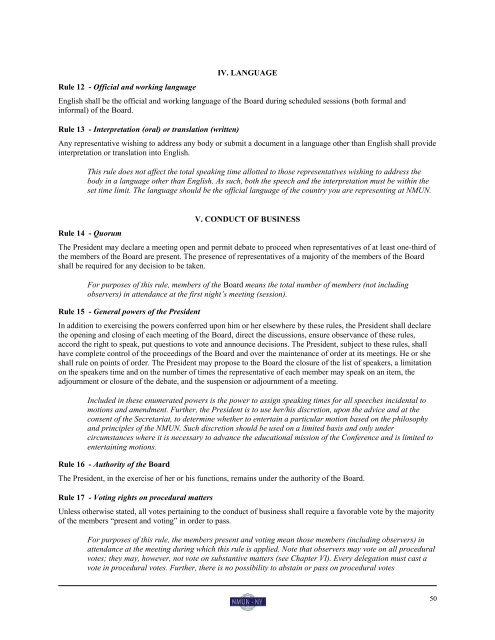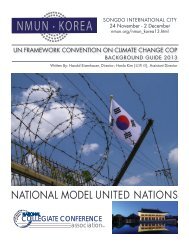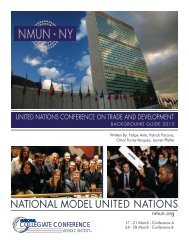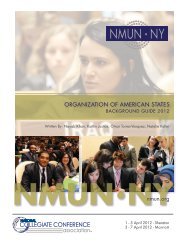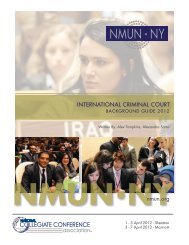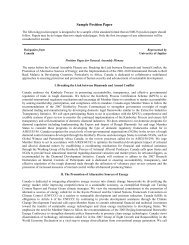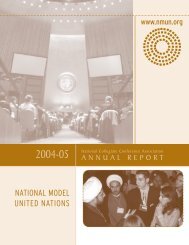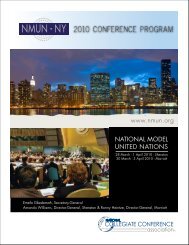UNFPA Background Guide - National Model United Nations
UNFPA Background Guide - National Model United Nations
UNFPA Background Guide - National Model United Nations
You also want an ePaper? Increase the reach of your titles
YUMPU automatically turns print PDFs into web optimized ePapers that Google loves.
Rule 12 - Official and working language<br />
IV. LANGUAGE<br />
English shall be the official and working language of the Board during scheduled sessions (both formal and<br />
informal) of the Board.<br />
Rule 13 - Interpretation (oral) or translation (written)<br />
Any representative wishing to address any body or submit a document in a language other than English shall provide<br />
interpretation or translation into English.<br />
This rule does not affect the total speaking time allotted to those representatives wishing to address the<br />
body in a language other than English. As such, both the speech and the interpretation must be within the<br />
set time limit. The language should be the official language of the country you are representing at NMUN.<br />
Rule 14 - Quorum<br />
V. CONDUCT OF BUSINESS<br />
The President may declare a meeting open and permit debate to proceed when representatives of at least one-third of<br />
the members of the Board are present. The presence of representatives of a majority of the members of the Board<br />
shall be required for any decision to be taken.<br />
For purposes of this rule, members of the Board means the total number of members (not including<br />
observers) in attendance at the first night’s meeting (session).<br />
Rule 15 - General powers of the President<br />
In addition to exercising the powers conferred upon him or her elsewhere by these rules, the President shall declare<br />
the opening and closing of each meeting of the Board, direct the discussions, ensure observance of these rules,<br />
accord the right to speak, put questions to vote and announce decisions. The President, subject to these rules, shall<br />
have complete control of the proceedings of the Board and over the maintenance of order at its meetings. He or she<br />
shall rule on points of order. The President may propose to the Board the closure of the list of speakers, a limitation<br />
on the speakers time and on the number of times the representative of each member may speak on an item, the<br />
adjournment or closure of the debate, and the suspension or adjournment of a meeting.<br />
Included in these enumerated powers is the power to assign speaking times for all speeches incidental to<br />
motions and amendment. Further, the President is to use her/his discretion, upon the advice and at the<br />
consent of the Secretariat, to determine whether to entertain a particular motion based on the philosophy<br />
and principles of the NMUN. Such discretion should be used on a limited basis and only under<br />
circumstances where it is necessary to advance the educational mission of the Conference and is limited to<br />
entertaining motions.<br />
Rule 16 - Authority of the Board<br />
The President, in the exercise of her or his functions, remains under the authority of the Board.<br />
Rule 17 - Voting rights on procedural matters<br />
Unless otherwise stated, all votes pertaining to the conduct of business shall require a favorable vote by the majority<br />
of the members “present and voting” in order to pass.<br />
For purposes of this rule, the members present and voting mean those members (including observers) in<br />
attendance at the meeting during which this rule is applied. Note that observers may vote on all procedural<br />
votes; they may, however, not vote on substantive matters (see Chapter VI). Every delegation must cast a<br />
vote in procedural votes. Further, there is no possibility to abstain or pass on procedural votes<br />
50


